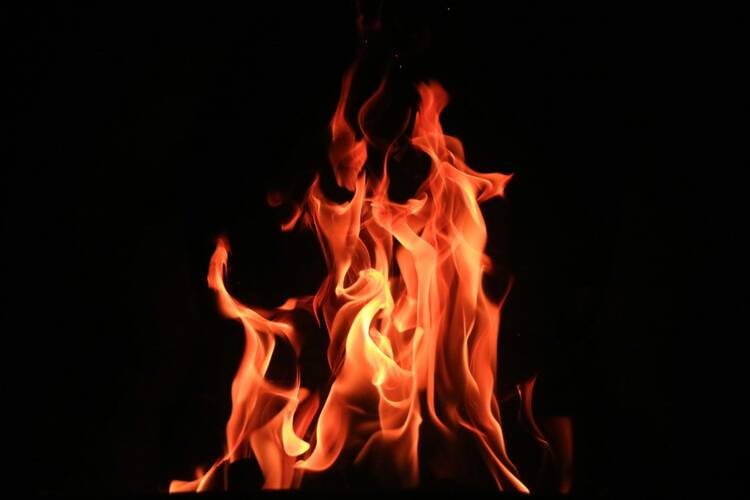A Reflection for Wednesday of the Fifth Week of Lent
Find today’s readings here.
“If our God, whom we serve, can save us from the white-hot furnace and from your hands, O king, may he save us! But even if he will not, know, O king, that we will not serve your god or worship the golden statue that you set up.” (Daniel 3:17-18)
There are a few theological questions involved in today’s first reading that can get scholars and students of Christology pretty worked up—most centering around that fourth man in the fire who “looks like a son of God.” Who is that in there with Shadrach, Meshach and Abednego? Depending on your translation (or source), it’s “a son of God,” “a son of gods,” “an angel of God” or “the Son of God.” That last one—600 years before the Incarnation—is the eyebrow-raiser.
But there’s another man whose absence, not presence, is striking in this story: Daniel himself. The chief of all of Nebuchadnezzar’s counselors, sometime governor of Babylon, he stars almost everywhere in the Book of Daniel, but he’s nowhere to be found in this famous tale. In fact, we learn a great deal about Daniel over the course of those 12 chapters—but almost nothing about Shadrach, Meshach and Abednego.
We do know from the first chapter of the Book of Daniel that they were young Jewish men who were taken from Judah along with Daniel to Babylon to be trained in Babylonian literature and language and then put into Nebuchadnezzar’s service. They were smart, good looking and well-informed, and they eventually outdo all the Babylonian sorcerers in wisdom and advice.
We don’t hear a lot more about them until they stand up to Nebuchadnezzar and refuse to worship his statue. Go ahead and try to kill us, they tell him. Maybe God will save us, but “even if he will not, know, O king, that we will not serve your god or worship the golden statue that you set up.” We know the rest of the story: God does indeed save them; Nebuchadnezzar is amazed by their courage and by their God; Nebuchadnezzar gives them a promotion; and then…we never hear about them again. We’re back to nine more chapters by and about Daniel.
Their return to obscurity despite their heroism—equal to if not greater than that of Daniel’s heroism in the lions’ den—reminded me of the quiet service of so many in the church who labor with the same intensity and devotion as our leaders and public representatives, but often go unrecognized.
If your kids go to a Catholic school, you know them as the teachers, the administrators, the campus ministers, the staff preparing liturgies and retreats and service opportunities and, well, dealing with parents. In your parish, they’re running the religious education program and the youth group and the confirmation prep. No one’s gonna mistake them for the bishop, for the celebrity Catholic, for the famous preacher or pastor or pal of the pope, but they’re the ones willing to hop into the metaphorical furnace day after day.
The same story gets repeated elsewhere, and not just in church institutions, but in our every line of work. There is no Book of Shadrach, Meshach and Abednego. But their quiet act of heroism—one that serves as a sort of template for future generations of martyrs and prophets—is still a sign of contradiction to the non-believer, the persecutor, the idolizer. Their faith and their willingness to put it into action earns favor and—literally, in this story—assistance from God.
Here’s to all the Shadrachs, Meshachs and Abednegos out there. Stay cool.








